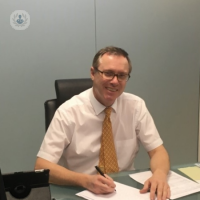Vertigo: is it really a fear of heights?
Written by:Vertigo is more than just a fear of heights. In fact, a fear of heights is called acrophobia. This is often confused with vertigo, possibly because of the spinning sensation felt when looking down from a high place, but true vertigo is much more than this. Mr Nicholas Eynon-Lewis, an experienced Consultant ENT Surgeon, explains further.

What is vertigo?
Vertigo is not actually a condition, but a symptom. It can be defined as an illusion or hallucination of movement. The word is derived from the Latin ‘vertere’, meaning to turn although it does not always involve a spinning sensation and sometimes can present with a sense of imbalance or sway. Often, patients will use the word dizziness which is synonymous with vertigo. It varies in severity and can be very subtle or be so severe that it can make it difficult to carry on with everyday tasks. Keeping your balance may be a struggle and attacks can last anything from only a few seconds to several days or even weeks at a time. Some patients will experience constant imbalance. You may also feel sick, with the urge to vomit. If these symptoms are persistent, make an appointment to see a doctor.
What are the causes of vertigo and dizziness?
Dizziness is often related to the inner ear where there is specialised neurological tissue that sends information about the position of the head to the brain. Many abnormalities of the ear can lead to some degree of vertigo. Specific conditions include BPPV (Benign Paroxysmal Positional Vertigo) which typically causes sudden spinning when moving the head to the side, for example when turning in bed. A virus can also affect the balance nerve causing what used to be termed ‘labyrinthitis’ although is now called vestibular neuronitis. Meniere’s disease is a condition that many people have heard of although it is not common. It can affect the patient in various ways. Typically, there are episodes of spinning with hearing loss and tinnitus (noise in the ear). The attacks usually last less than 24 hours.
Vertigo can also be caused by problems in certain areas of the brain. A condition that is often overlooked is migraine. Sometimes the balance problems associated with migraine occur at times when the patient does not have a headache. Other neurological conditions such as multiple sclerosis and rarely a tumour or a small stroke can present with balance problems.
The diagnosis is often characterised by the exact nature and duration of the patient’s symptoms. It sometimes needs to be investigated with tests and sometimes an MRI brain scan is required.
What are the treatment options?
This will very much depend on the diagnosis. BPPV can often be cured in the doctor’s surgery by moving the patient’s head in certain directions which unblocks the tiny semi-circular canals in the inner ear which we think have become blocked with calcium debris. This is called the Epley manoeuvre.
With acute severe vertigo, we use medication that suppresses the balance system but as soon as the patient’s symptoms start to settle, we actually want to stimulate the balance system to promote recovery. The system has an amazing ability to recover from damage to the balance apparatus. Just think of how skaters can learn to overcome dizziness after rotating on the spot! This shows how the balance system can adapt with training.
Balance exercises can be extremely effective in treating persistent or chronic vertigo.
Sometimes there are specific medications used, for example in Meniere’s disease. Of course, if there is an underlying cause such as migraine, it will need to be treated.
If problems persist and your vertigo shows no signs of getting better, you should visit a specialist who can assess your symptoms in detail and recommend what to do going forward.

